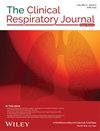Association of COPD With Clinical Outcomes After Hospital Admission in SARS-CoV-2 Patients During the Omicron Variant Period: A Retrospective Cohort Study
Abstract
Background
Pre-Omicron studies identified chronic obstructive pulmonary disease (COPD) as a significant risk factor for adverse COVID-19 outcomes. Given Omicron's altered pathogenicity and widespread population-level immunity, the association between COPD and COVID-19 outcomes warrants reassessment in light of the variant's distinct clinical profile. We evaluated whether COPD remained a risk factor for poor clinical outcomes among hospitalized patients with SARS-CoV-2 infection during Omicron predominance.
Methods
We conducted a two-center retrospective cohort study of 1176 adults hospitalized with confirmed Omicron infection between January 2022 and December 2023 in Northern China. Patients were stratified by pre-existing COPD status. To address confounding by treatment selection, inverse probability weighting (IPW) was applied based on the likelihood of receiving inhaled corticosteroids. Multivariable logistic regression models, adjusted for comorbidities, disease severity (as measured by the PSI), inflammatory markers (CRP, D-dimer, NLR, LDH), and treatment regimens, were used to evaluate the associations between COPD and in-hospital outcomes.
Results
Among 1176 patients (337 COPD; 839 non-COPD), COPD patients had significantly lower PSI scores and lower levels of systemic inflammation despite a higher prevalence of respiratory comorbidities. In unadjusted models, COPD was associated with reduced odds of mortality (OR 0.52), respiratory failure (OR 0.24), and ventilatory support. However, after IPW adjustment, these associations were no longer statistically significant (mortality: adjusted OR 0.90, 95% CI 0.22–3.74, p = 0.887).
Conclusions
COPD was not independently associated with increased risk of mortality, respiratory failure, or ventilatory support in hospitalized Omicron-infected patients after rigorous adjustment for confounding. These findings suggest a shifting risk profile for COPD during Omicron predominance, likely influenced by variant tropism, treatment effects, and altered inflammatory responses. Future prospective studies are warranted to validate these findings and explore the mechanisms underlying this observed shift.


 求助内容:
求助内容: 应助结果提醒方式:
应助结果提醒方式:


